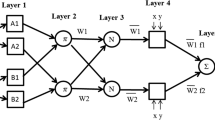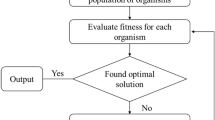Abstract
A novel type of coronavirus, now known under the acronym COVID-19, was initially discovered in the city of Wuhan, China. Since then, it has spread across the globe and now it is affecting over 210 countries worldwide. The number of confirmed cases is rapidly increasing and has recently reached over 14 million on July 18, 2020, with over 600,000 confirmed deaths. In the research presented within this paper, a new forecasting model to predict the number of confirmed cases of COVID-19 disease is proposed. The model proposed in this paper is a hybrid between machine learning adaptive neuro-fuzzy inference system and enhanced genetic algorithm metaheuristics. The enhanced genetic algorithm is applied to determine the parameters of the adaptive neuro-fuzzy inference system and to enhance the overall quality and performances of the prediction model. Proposed hybrid method was tested by using realistic official dataset on the COVID-19 outbreak in the state of China. In this paper, proposed approach was compared against multiple existing state-of-the-art techniques that were tested in the same environment, on the same datasets. Based on the simulation results and conducted comparative analysis, it is observed that the proposed hybrid approach has outperformed other sophisticated approaches and that it can be used as a tool for other time-series prediction.
Access this chapter
Tax calculation will be finalised at checkout
Purchases are for personal use only
Similar content being viewed by others
References
C. S. G. of the International et al.: The species severe acute respiratory syndrome-related coronavirus: classifying 2019-ncov and naming it sars-cov-2. Nat. Microbiol. 5(4), 536 (2020)
Yadav, T., Saxena, S.K.: Transmission Cycle of SARS-CoV and SARS-CoV-2, pp. 33–42. Springer, Singapore (2020)
Chan, J.F.-W., Yuan, S., Kok, K.-H., To, K.K.-W., Chu, H., Yang, J., Xing, F., Liu, J., Yip, C.C.-Y., Poon, R.W.-S., et al.: A familial cluster of pneumonia associated with the 2019 novel coronavirus indicating person-to-person transmission: a study of a family cluster. Lancet 395(10223), 514–523 (2020)
W. H. Organization et al.: Coronavirus disease 2019 (covid-19): situation report, 72 (2020)
Ardabili, S.F., Mosavi, A., Ghamisi, P., Ferdinand, F., Varkonyi-Koczy, A.R., Reuter, U., Rabczuk, T., Atkinson, P.M.: Covid-19 outbreak prediction with machine learning. Available at SSRN 3580188 (2020)
Pinter, G., Felde, I., Mosavi, A., Ghamisi, P., Gloaguen, R.: Covid-19 pandemic prediction for hungary; a hybrid machine learning approach. In: A Hybrid Machine Learning Approach (2020)
Suzuki, Y., Suzuki, A.: Machine learning model estimating number of covid-19 infection cases over coming 24 days in every province of South Korea (xgboost and multioutputregressor)
Jang, J.-S.: Anfis: adaptive-network-based fuzzy inference system. IEEE Trans. Syst. Man Cybern. 23(3), 665–685 (1993)
Karaboga, D., Kaya, E.: Adaptive network based fuzzy inference system (anfis) training approaches: a comprehensive survey. Artif. Intell. Rev. 52(4), 2263–2293 (2019)
Uyar, K., Ilhan, U., Iseri,E.I., Ilhan, A.: Forecasting measles cases in Ethiopia using neuro-fuzzy systems. In: 2019 3rd International Symposium on Multidisciplinary Studies and Innovative Technologies (ISMSIT), pp. 1–5 (2019)
Khodaei-mehr, J., Tangestanizadeh, S., Vatankhah, R., Sharifi, M.: Anfis-based optimal control of hepatitis c virus epidemic. IFAC-PapersOnLine 51(15), 539–544 (2018)
Uçar, T., Karahoca, A., Karahoca, D.: Tuberculosis disease diagnosis by using adaptive neuro fuzzy inference system and rough sets. Neural Comput. Appl. 23(2), 471–483 (2013)
Al-qaness, M.A.A., Ewees, A.A., Fan, H., Aziz, M.A.E.: Optimization method for forecasting confirmed cases of COVID-19 in china. J. Clin. Med. 9(3), 674–674 (2020)
Strumberger, I., Bacanin, N., Tuba, M.: Enhanced firefly algorithm for constrained numerical optimization, ieee congress on evolutionary computation. In: Proceedings of the IEEE International Congress on Evolutionary Computation (CEC 2017), pp. 2120–2127 (2017)
Tuba, E., Strumberger, I., Bacanin, N., Tuba, M.: Bare bones fireworks algorithm for capacitated p-median problem. In: Tan, Y., Shi, Y., Tang, Q. (eds.) Advances in Swarm Intelligence. pp. 283–291. Springer International Publishing Berlin (2018)
Strumberger, I., Minovic, M., Tuba, M., Bacanin, N.: Performance of elephant herding optimization and tree growth algorithm adapted for node localization in wireless sensor networks. Sensors 19(11), 2515 (2019)
Goldberg, D.E. : Genetic Algorithms in Search, Optimization and Machine Learning, 1st ed. Addison-Wesley Longman Publishing Co., Inc., Boston (1989)
Wang, T., Liu, Z ., Chen, Y., Xu, Y., X. Dai, “Load balancing task scheduling based on genetic algorithm in cloud computing. In: 2014 IEEE 12th International Conference on Dependable, Autonomic and Secure Computing, pp. 146–152 (2014)
Suganuma, M., Shirakawa, S., Nagao, T.: A genetic programming approach to designing convolutional neural network architectures. In: Proceedings of the Genetic and Evolutionary Computation Conference (GECCO ’17), New York, NY, USA, pp. 497–504. ACM (2017)
Xue, B., Zhang, M., Browne, W.N., Yao, X.: A survey on evolutionary computation approaches to feature selection. IEEE Trans. Evolution. Comput. 20(4), 606–626 (2015)
Kennedy, J., Eberhart, R.: Particle swarm optimization. In: Proceedings of the IEEE International Conference on Neural Networks (ICNN ’95), vol. 4, pp. 1942–1948 (1995)
Tuba, M., Bacanin, N.: Artificial bee colony algorithm hybridized with firefly metaheuristic for cardinality constrained mean-variance portfolio problem. Appl. Math. Inform. Sci. 8, 2831–2844 (2014)
Bacanin, N., Tuba, M., Strumberger, I.: Rfid network planning by abc algorithm hybridized with heuristic for initial number and locations of readers. In: 2015 17th UKSim-AMSS International Conference on Modelling and Simulation (UKSim), pp. 39–44. IEEE (2015)
Yang, X.-S. : A New Metaheuristic Bat-Inspired Algorithm, pp, 65–74. Springer, Berlin (2010)
Tuba, M., Bacanin, N.: Hybridized bat algorithm for multi-objective radio frequency identification (rfid) network planning. In: 2015 IEEE Congress on Evolutionary Computation (CEC), pp. 499–506 (2015)
Tuba, M., Alihodzic, A., Bacanin, N.: Cuckoo search and bat algorithm applied to training feed-forward neural Networks, pp. 139–162. Springer International Publishing, Cham (2015)
Bacanin, N.: Implementation and performance of an object-oriented software system for cuckoo search algorithm. Int. J. Math. Comput. Simulation 6, 185–193 (2010)
Strumberger, I., Bacanin, N., Tuba, M., Tuba, E.: Resource scheduling in cloud computing based on a hybridized whale optimization algorithm. App. Sci. 9(22), 4893 (2019)
Bacanin , N., Tuba, M.: Firefly algorithm for cardinality constrained mean-variance portfolio optimization problem with entropy diversity constraint. In: Sci. World J. 2014, 16. Article ID 721521 (2014)(special issue Computational Intelligence and Metaheuristic Algorithms with Applications)
Strumberger, I., Tuba, E., Bacanin,N., Beko, M., Tuba, M.: Monarch butterfly optimization algorithm for localization in wireless sensor networks. In: 2018 28th International Conference Radioelektronika (RADIOELEKTRONIKA), pp. 1–6 (2018)
Bacanin, N., Bezdan, T., Tuba, E., Strumberger, I., Tuba, M.: Monarch butterfly optimization based convolutional neural network design. Mathematics 8(6), 936 (2020)
Karaboga, D., Kaya, E.: Estimation of number of foreign visitors with anfis by using abc algorithm. Soft Comput. 1–13 (2019)
Karaboga, D., Kaya, E.: Training anfis by using an adaptive and hybrid artificial bee colony algorithm (aabc) for the identification of nonlinear static systems. Arab. J. Sci. Eng. 44(4), 3531–3547 (2019)
Mir, M., Kamyab, M., Lariche, M.J., Bemani, A., Baghban, A.: Applying anfis-pso algorithm as a novel accurate approach for prediction of gas density. Petrol. Sci. Technol. 36(12), 820–826 (2018)
Holland, J.H., et al.: Adaptation in Natural and Artificial Systems: An Introductory Analysis with Applications to Biology, Control, and Artificial Intelligence. MIT press, Cambridge (1992)
“Nature-Inspired optimization algorithms. In: Yang, X.-S., Nature-Inspired Optimization Algorithms, p. i. Elsevier, Oxford (2014)
Karaboga, D., Akay, B.: A modified artificial bee colony (ABC) algorithm for constrained optimization problems. Appl. Soft Comput. 11(3), 3021–3031 (2011)
Mitchell, M.: An Introduction to Genetic Algorithms. MIT Press, Cambridge (1998)
Author information
Authors and Affiliations
Corresponding author
Editor information
Editors and Affiliations
Rights and permissions
Copyright information
© 2021 The Editor(s) (if applicable) and The Author(s), under exclusive license to Springer Nature Singapore Pte Ltd.
About this paper
Cite this paper
Zivkovic, M. et al. (2021). Hybrid Genetic Algorithm and Machine Learning Method for COVID-19 Cases Prediction. In: Shakya, S., Balas, V.E., Haoxiang, W., Baig, Z. (eds) Proceedings of International Conference on Sustainable Expert Systems. Lecture Notes in Networks and Systems, vol 176. Springer, Singapore. https://doi.org/10.1007/978-981-33-4355-9_14
Download citation
DOI: https://doi.org/10.1007/978-981-33-4355-9_14
Published:
Publisher Name: Springer, Singapore
Print ISBN: 978-981-33-4354-2
Online ISBN: 978-981-33-4355-9
eBook Packages: EngineeringEngineering (R0)




